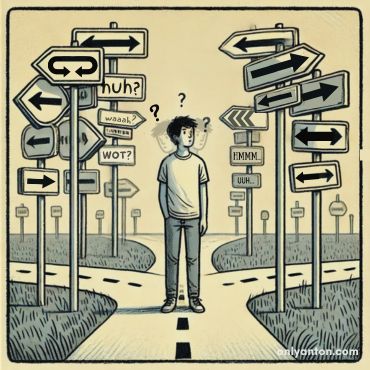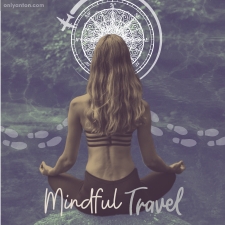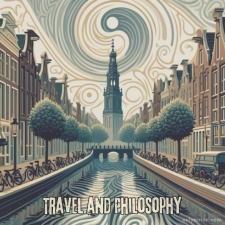Part 4 of the Navigating Decisions: Mindful Travel and Intentional Living series

Introduction
Have you ever found yourself caught in a loop of endless deliberation, unable to make a decision? Overcoming overthinking can be a significant challenge, especially when making travel plans. Many of us have experienced the frustrating state of paralysis by analysis. We become so bogged down by options and details that we end up making no decision at all. This indecisiveness delays our travel plans and can diminish the joy and spontaneity that make travel so rewarding.
In this blog post, we will explore the concept of paralysis by analysis, particularly as it pertains to travel. We’ll delve into the psychological and emotional factors that contribute to this state of overthinking and provide practical solutions to help you make confident, mindful travel decisions. This discussion will build on the ideas presented in my previous posts, such as the Indecision Dilemma. This post will also set the stage for future posts on topics like satisficing in travel choices. By understanding the root causes of overthinking and learning strategies to overcome it, you can enhance your travel experiences, making them more intentional and fulfilling. Let’s embark on this journey together to conquer paralysis by analysis and unlock the joy of mindful travel.
Understanding Paralysis by Analysis
Paralysis by analysis is a phenomenon where overanalyzing or overthinking a situation leads to inaction. In travel planning, this can manifest as the inability to make decisions due to being overwhelmed by too many options or details. The term often describes a state where the fear of making the wrong choice or the desire to make the perfect decision prevents any decision from being made at all.
Common Causes of Overthinking
One of the common causes of paralysis by analysis is anxiety. The sheer number of choices—from destinations and accommodations to activities and dining options—can become overwhelming when planning a trip. This anxiety is often compounded by the fear of making a mistake, which can lead to excessive deliberation and second-guessing. Instead of enjoying the process of planning a trip, individuals may find themselves stuck in a loop of indecision, constantly researching and comparing options without ever making a final decision.
Another significant factor contributing to paralysis by analysis is information overload. In today’s digital age, we have access to an almost limitless amount of information about potential travel destinations. While this can be a great resource, it can also be a double-edged sword. The abundance of reviews, blog posts, and social media recommendations can make it challenging to filter through the noise and make a clear, confident decision. This overload of information can lead to procrastination and ultimately result in missed opportunities or last-minute, rushed decisions.
Consequences of Overthinking
The implications of paralysis by analysis are far-reaching, especially in the context of travel. Overthinking can delay travel plans, leading to increased costs and limited availability for flights and accommodations. It can also diminish the joy and excitement of travel. The process becomes more about navigating stress and anxiety rather than anticipating a rewarding experience. Furthermore, the inability to make timely decisions can lead to a lack of spontaneity and adventure, which are often the most memorable aspects of travel.
In summary, understanding the roots of paralysis by analysis is crucial for overcoming it. Recognizing the role of anxiety, fear of making the wrong choice, and information overload can help travellers take proactive steps to mitigate these factors. By doing so, they can make more confident and mindful travel decisions, leading to richer and more satisfying travel experiences.

The Connection Between Buridan’s Ass and Paralysis by Analysis
In the previous blog post, “Indecision Dilemma: Lessons from Buridan’s Ass,” we explored the thought experiment of Buridan’s Ass. This philosophical dilemma illustrates the paralysis that can occur when faced with two equally attractive options. To briefly recap, Buridan’s Ass is a thought experiment attributed to the 14th-century philosopher Jean Buridan. It describes a hypothetical scenario where a donkey is placed precisely midway between two identical piles of hay. Unable to choose between them, the donkey starves to death due to a lack of a rational basis for preferring one over the other. This paradox highlights the challenges of decision-making when no apparent reason exists to choose one option over another.
Connections Between the Two Cases
The connection between Buridan’s Ass and paralysis by analysis lies in the shared themes of excessive deliberation, indecision, and inaction. Both concepts illustrate how overthinking and the inability to make a decision can lead to negative consequences. In the case of Buridan’s Ass, the donkey’s indecision leads to its demise. Paralysis by analysis, by contrast, can cause individuals to miss opportunities or face delays. These individuals cannot make timely decisions because they overanalyze their options. In travel planning, this can manifest as missed opportunities, increased costs, and diminished enjoyment of the travel experience.
Differences Between the Two Cases
One key difference between the two scenarios is the nature of the decision-making process. Buridan’s Ass is immobilized by the lack of a differentiating factor between the two choices, leading to inaction. One could say that the choice is underdetermined. On the other hand, paralysis by analysis often involves an overcompensation for this lack of differentiation. When faced with too few reasons for choosing one option over another, people can swing too far the other way. They may overanalyze the differences between choices in an attempt to make the “perfect” decision. Such choices tend to be overdetermined. The result is an overwhelming amount of information to process, further exacerbating indecision and inaction.
Understanding the connection between Buridan’s Ass and paralysis by analysis can help travellers recognize the pitfalls of overthinking and indecision. By acknowledging the similarities and differences between these concepts, we can develop strategies to mitigate the effects of paralysis by analysis. This, in turn, can lead to more confident and mindful travel decisions. This approach aligns with the values of mindful travel. It emphasizes the importance of being present and making intentional choices that enhance the overall travel experience.
The Influence of Social Pressure
Keeping Up with the Joneses
The phrase “Keeping Up with the Joneses” originated in the early 20th century. It was popularized by a comic strip of the same name created by Arthur R. “Pop” Momand. The comic strip depicted the social and economic pressures faced by the McGinnis family as they tried to keep up with their neighbours, the Joneses. Over time, the phrase has come to symbolize the societal pressure to match the lifestyle and possessions of one’s peers, leading to competitive consumption and social anxiety. This pressure can drive individuals to make decisions based on external validation rather than personal fulfillment, contributing to stress and dissatisfaction.
The Fear of Missing Out
In the modern era, the concept of “Keeping Up with the Joneses” has evolved into what we now know as FOMO (Fear of Missing Out). FOMO refers to the anxiety that others are having rewarding experiences from which one is absent. The rise of social media has exacerbated this phenomenon of people showcasing curated, idealized versions of their lives. Platforms like Instagram, Facebook, and TikTok are rife with images and stories of exotic vacations, gourmet meals, and other enviable experiences. This constant exposure to the highlights of others’ lives can create a sense of inadequacy and a fear of being left out.

The Influence of Social Media
The influence of social media on travel decision-making is significant. People often choose destinations, activities, and accommodations based on what they see shared by others online. This influence can be positive, providing inspiration and ideas for travel. However, it can also create unrealistic expectations and pressure to replicate the experiences seen online. The desire to have a picture-perfect vacation, just like the ones seen on social media, can lead to disappointment and anxiety when reality does not match the curated images.
FOMO and the pressure to “keep up with the Joneses” contribute to paralysis by analysis in travel planning. The fear of making the wrong choice or missing out on a better experience can lead to overthinking and indecision. Travellers might find themselves endlessly comparing options, reading reviews, and seeking the perfect itinerary, only to become overwhelmed and unable to make a decision. This behaviour can result in missed opportunities and a less enjoyable travel experience.
Understanding the impact of social pressure and FOMO on travel decisions is crucial for mindful travel. By recognizing these influences, travellers can focus on what personally brings them joy and fulfillment rather than trying to meet perceived societal standards. Strategies such as setting boundaries on social media use, focusing on personal values, and embracing the concept of satisficing can help mitigate the effects of social pressure and reduce paralysis by analysis.
Buyer’s Remorse and Negativity Bias
Understanding the psychological dynamics behind decision-making can significantly help mitigate the effects of social pressure and overthinking. Two key concepts that often play a role in decision-making anxiety are buyer’s remorse and negativity bias.
Buyer’s Remorse
Buyer’s remorse refers to regret or anxiety following a decision, particularly when numerous options are available. This remorse can be intensified by cognitive dissonance, which occurs when there is a conflict between expectations and reality, leading to discomfort if the chosen option doesn’t meet expectations. Another contributing factor is the concept of opportunity cost—the idea that choosing one option means missing out on others. This fear of missing out can lead to second-guessing if the unchosen options appear better in hindsight. Moreover, choice overload can overwhelm individuals, making them more likely to feel regret and dissatisfaction even if their final choice is objectively good.
Negativity Bias
The negativity bias is a cognitive bias where negative experiences substantially impact our mental state more than positive ones. Behavioural economics research shows that people are more sensitive to losses than gains. This bias means the fear of making the wrong choice (and thus experiencing a loss) can be more pronounced. Negative emotions like regret and disappointment often have a more substantial impact than positive emotions like satisfaction. Additionally, negative experiences tend to be remembered more vividly and dwelled upon longer than positive ones, which can increase anxiety about future decisions.
Decision-Making Anxiety
The combination of buyer’s remorse, negativity bias, and social media pressure can lead to significant decision-making anxiety. The fear of making the wrong choice and the desire to keep up with others can result in overanalyzing and indecision. This anxiety can be particularly pronounced in travel planning, where the stakes of making the “perfect” choice feel high.
By understanding these psychological mechanisms, travellers can develop strategies to mitigate their impact, leading to more intentional and fulfilling travel experiences. This approach aligns with the values of the Only Anton brand, emphasizing mindful and meaningful travel.

Strategies to Overcome Paralysis by Analysis
Mindful Travel
Making mindful travel decisions involves aligning your choices with your personal values and desires rather than external pressures or unrealistic expectations. Mindful travel emphasizes the importance of being present and making intentional decisions that enhance your travel experience. This approach helps you focus on what truly matters to you rather than getting lost in endless deliberation.
Practical Tips
Set Clear Priorities: Identify what matters most to you in your travel experience. Knowing your priorities can streamline your decision-making process, whether it’s cultural immersion, relaxation, adventure, or culinary delights.
Example: If your priority is cultural immersion, focus on destinations known for their rich history and local experiences. Avoid getting distracted by other options that don’t align with this goal.
Break Decisions into Smaller Steps: Large decisions can feel overwhelming. Break them down into manageable steps to make the process less daunting.
Example: Instead of deciding on an entire itinerary, start by choosing your destination. After that, gradually plan accommodations, activities, and dining options.
Use Decision-Making Tools: Tools like pros and cons lists, decision matrices, and mind maps can help organize your thoughts and visualize your options.
Example: Create a decision matrix including cost, travel time, cultural experiences, and personal interest. Rate each potential destination based on these criteria to see which scores highest overall.
Introducing Satisficing
Satisficing is a decision-making strategy that involves choosing an option that meets your criteria for adequacy rather than searching for the perfect solution. This approach can significantly reduce the stress and time involved in making decisions, allowing you to enjoy your travels more fully.
Benefits of Satisficing:
Reduced Stress: Set realistic standards and recognize that a good enough option is often sufficient. In this way, you can alleviate the pressure to make the perfect choice.
Increased Satisfaction: Satisficing can lead to greater contentment by preventing the endless search for better options and reducing the risk of decision fatigue.
Applying Satisficing to Travel:
Example: When choosing a hotel, stop comparing dozens of options. Instead, set your criteria (e.g., clean, central location, good reviews) and select the first one that meets these standards. This approach saves time and reduces anxiety.
In the next post in this series, we will delve deeper into the concept of satisficing, exploring its origins, benefits, and practical applications in travel planning. This comprehensive guide will provide you with the tools to make travel decisions that are both efficient and satisfying, ensuring a more enjoyable and stress-free travel experience.
By integrating mindfulness practices, practical decision-making strategies, and the concept of satisficing, you can overcome the pitfalls of paralysis by analysis. This approach aligns with the values of mindful travel, emphasizing intentional and fulfilling travel experiences.
Balancing Rationality and Emotion

Importance of Combining Rational Analysis with Emotional Intuition
Making well-rounded decisions requires integrating both rational analysis and emotional intuition. Rational analysis involves logical reasoning, assessing pros and cons, and considering factual information. Emotional intuition, on the other hand, taps into our feelings, gut reactions, and personal values. Together, these aspects create a balanced decision-making process.
Combining these elements helps prevent overthinking and promotes decisive action. Rational analysis ensures that decisions are grounded in logic and facts. Emotional intuition provides a sense of personal satisfaction and alignment with one’s values and desires. This balance is particularly crucial in travel planning, where both logistical considerations and emotional fulfillment play significant roles.
Techniques for Fostering Clearer Decision-Making
Mindfulness Meditation
Mindfulness meditation is a powerful tool for calming the mind, reducing anxiety, and enhancing focus. By practicing mindfulness, travellers can cultivate mental clarity and presence, which are essential for making clear and confident decisions. Meditation helps quiet the mind’s incessant chatter, allowing individuals to approach decisions with a calm and focused mindset. This practice can significantly reduce the stress of overthinking and create a mental space for more intuitive and balanced decision-making.
Reflective Journalling
Reflective journalling is another effective technique for organizing thoughts and clarifying priorities. Writing down thoughts and feelings about travel options can provide emotional insight and help identify what personally matters. This process allows travellers to explore their motivations, fears, and desires, ultimately leading to more intentional and satisfying decisions. Journalling can also reveal patterns and preferences that might not be immediately apparent, aiding in the prioritization of options and reducing the likelihood of becoming overwhelmed by choices.
Setting Priorities and Limits
Setting Clear Priorities
Establishing clear priorities is essential for focusing on what truly matters. By identifying the most important aspects of a trip—cultural experiences, relaxation, adventure, or connection—travellers can narrow their options and avoid getting bogged down by less critical details. Clear priorities act as a guiding framework.They can ensure that decisions align with personal values and goals, thereby reducing the risk of overanalyzing every detail.
Setting Limits
Setting limits, such as time constraints and decision deadlines, is crucial for preventing prolonged deliberation and promoting timely action. By imposing these boundaries, travellers can avoid the trap of endless analysis and make confident decisions within a reasonable timeframe. This approach helps break the cycle of overthinking. It encourages decisive action and ensures that travel plans move forward smoothly and efficiently.
Incorporating these strategies into decision-making can help travellers balance rationality and emotion, ultimately leading to more fulfilling and enjoyable travel experiences. By emphasizing mindfulness, reflection, clear priorities, and practical limits, individuals can overcome the challenges of overthinking and embrace a more intentional approach to their journeys.
Practical Applications for Travel
Real-Life Examples of Applying These Strategies in Travel Planning
Applying the strategies of balancing rationality and emotion, mindful travel, and setting clear priorities can significantly enhance the travel planning experience. For instance, when planning a trip to a culturally rich destination like Prague, identify your primary interests: historical sites, art, or local cuisine. Use reflective journalling to document why these interests matter to you and how they align with your personal values and travel goals. This process will help prioritize activities that genuinely resonate with you.
For example, if you have a deep interest in history, prioritize visits to places like Prague Castle, Old Town Square, and the Jewish Quarter. Include the Mucha Museum and other art galleries in your itinerary if your passion lies in art. By focusing on what personally matters, you can avoid being overwhelmed by the sheer number of options and make decisions that bring you joy and satisfaction.
Tips for Avoiding Social Pressure
Social media can pressure travellers to conform to idealized images and experiences. To mitigate this, consider setting boundaries on your social media usage. Limit your time on these platforms, especially during the planning phase and while travelling. This approach helps you stay grounded in your own preferences and reduces the tendency to compare your plans to others.
Another effective strategy is to curate your social media feeds. Follow accounts that inspire and uplift you rather than those that induce envy or anxiety. Focus on content that aligns with your travel interests and values, providing genuine inspiration rather than pressure to conform.
Embracing Unique and Authentic Travel Experiences
Encourage yourself to embrace unique and authentic travel experiences that align with your personal interests and values. Rather than following the crowd to popular tourist destinations, seek out less-publicized attractions that offer a more authentic glimpse into the local culture. Such a choice could mean visiting a local market, participating in a traditional craft workshop, or exploring off-the-beaten-path neighbourhoods.
For instance, instead of just visiting the iconic Charles Bridge in Prague, stroll through the lesser-known Vyšehrad district. Enjoy the historical fortifications, beautiful views, and the peaceful atmosphere away from the bustling tourist spots. This approach enriches your travel experience and allows for deeper connections with the local culture and people.
By applying these practical strategies, travellers can overcome paralysis by analysis and social pressure, making decisions that lead to more fulfilling and authentic travel experiences. Focusing on personal fulfillment and staying true to one’s interests and values ensures that each journey is both meaningful and memorable.
Conclusion
In this blog post, we’ve explored the concept of paralysis by analysis, a common pitfall in decision-making that can significantly impact travel planning and overall satisfaction. We discussed how overanalyzing options could lead to inaction and missed opportunities, emphasizing the importance of balancing rational analysis with emotional intuition to make more decisive and fulfilling travel choices.
We also examined the connection between Buridan’s Ass and paralysis by analysis, highlighting the shared themes of excessive deliberation, indecision, and inaction. By understanding these concepts, travellers can recognize the patterns that lead to overthinking and take steps to overcome them. Social pressures, such as “keeping up with the Joneses” and the fear of missing out (FOMO), further complicate decision-making, often resulting in anxiety and dissatisfaction. By acknowledging these pressures and focusing on personal fulfillment, travellers can make more authentic and satisfying choices.
Our discussion included practical strategies for overcoming paralysis by analysis, such as setting clear priorities, breaking decisions into manageable steps, and employing decision-making tools. Mindful travel practices, like reflective journalling and mindfulness meditation, can also help reduce anxiety and foster clearer decision-making. Introducing the concept of satisficing—making decisions that are “good enough” rather than perfect—provides a practical framework for reducing stress and enhancing travel satisfaction.
As you reflect on your travel decision-making processes, consider how these insights and strategies can help you navigate the complexities of planning your next adventure. Share your experiences and thoughts in the comments section, and let’s continue this conversation on intentional living and mindful travel.
Stay tuned for the next installment in the Navigating Decisions series. I’ll delve into the concept of satisficing and offer a comprehensive guide to making balanced and satisfying travel choices. Together, we can learn to embrace the journey, make intentional decisions, and create meaningful travel experiences that resonate with our values and desires.
What About You?
I’d love to hear from you! How have you dealt with paralysis by analysis in your travel planning or other areas of your life? Have you ever felt overwhelmed by overthinking or the pressures of FOMO and social media? What strategies have you found helpful in overcoming these challenges and making confident decisions?
Share your stories, tips, and experiences in the comments below. Your insights can inspire and help fellow readers navigate their own decision-making processes.
Don’t forget to subscribe to the Only Anton blog for more travel stories, tips, and insights into mindful travel and intentional living. Stay connected as we continue to explore ways to enhance our travel experiences and make intentional, satisfying choices. Together, we can make our journeys enjoyable, deeply fulfilling, and memorable.
Further Reading and Resources
Related Blog Posts on Only Anton
- Passion and Mindful Travel: Explore the general concept of passion in travel, its etymology, and its relation to mindful travel.
- Understanding Descartes’ Error: Embracing Emotion in Mindful Travel: Delve into Antonio Damasio’s work and the role of emotions in decision-making.
- Indecision Dilemma: Lessons from Buridan’s Ass: Learn from the classic thought experiment of Buridan’s Ass to overcome travel indecision and make mindful choices.
- Mindful Travel: Finding Meaning in Our Journeys: Discover how to incorporate mindfulness into your travels for a more enriching experience.
- Travel and Philosophy: Reflect on the philosophical aspects of travel and how it can deepen your understanding of the world.
- Best Things to Do in Prague: History, Culture, and Dining: A comprehensive guide to exploring Prague’s historic and cultural wonders.
The following resources will provide you with a deeper understanding of the concepts discussed in this blog post and offer additional tools and strategies for making mindful and intentional travel decisions.
Books
- The Paradox of Choice: Why More Is Less, by Barry Schwartz: Explore how the abundance of choice in modern life can lead to decision-making paralysis and dissatisfaction. Find it online, at a local library, or buy your copy here.
- Blink: The Power of Thinking Without Thinking, by Malcolm Gladwell: Gladwell discusses how we make decisions in the blink of an eye and the benefits of trusting our instincts. Find it online, at a local library, or buy your copy here.
- Mindfulness for Beginners. by Jon Kabat-Zinn: An introduction to mindfulness practice and its benefits for reducing stress and enhancing decision-making. Find it online, at a local library, or buy your copy here.
Articles
- “Decisions Are For Suckers: Avoid Decision Fatigue,” by Nell Derick-Debevoise, Forbes (October 2023): Explores the concept of decision fatigue and offers practical tips to manage and reduce its effects. Find the article here.
- “How to Beat ‘Analysis Paralysis’ and Make All the Decisions,” by Crystal Raypole, Healthline (April 2020): A discussion of the psychological basis of analysis paralysis and strategies to overcome it. Read the article here.
- “10 Ways to Overcome Fear of Missing Out,” by Linda and Charlie Bloom, Psychology Today (January 2015): An article that offers insights into managing the fear of missing out and making confident decisions. Find it here.
- “Stop Overthinking Now: 18 Ways to Control Your Mid Again,” by Crystal Miller, Science of People (June 2024): Practical advice and techniques for reducing overthinking and improving decision-making skills. Read the article here.
- “Satisficing,” Wikipedia: An overview of the concept of satisificing. Follow this link.
Websites
- Greater Good Magazine: This website provides articles and resources on incorporating mindfulness into decision-making processes.
- Psychology Today: A website offering various articles on the psychology of indecision and tips for overcoming it.
- Mindful.org: A comprehensive resource for mindfulness practices and their applications in everyday life.
- Science of People: A website that provides science-based advice about communication and social skills.





I liked your illustrations for this post. I had to look up the meaning of “satisficing”. At first I thought it was a spelling error but then quickly realized that this could not be the case in an article written by you. 😀
Hahaha. Yeah, “satisficing” is not in the common lexicon. Glad you liked the illustrations.